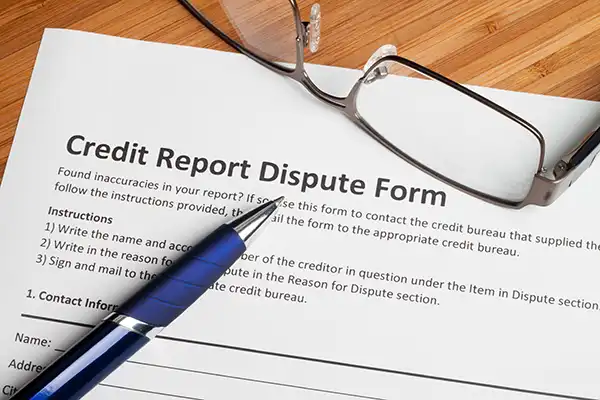Understanding the Fair Credit Reporting Act
Enacted in 1970, the Fair Credit Reporting Act (FCRA) regulates the collection, dissemination, and use of consumer credit information. Among its provisions, the FCRA mandates that credit reporting agencies maintain accurate and up-to-date consumer credit reports. It also grants consumers the right to dispute inaccurate information on their credit reports and requires credit bureaus to investigate and correct errors within a reasonable timeframe. Additionally, the FCRA imposes obligations on creditors and furnishers to report information accurately and promptly, further safeguarding consumers' credit information. When credit report errors are not corrected promptly, the consumer rights attorneys use the FCRA to pursue justice through litigation.
Types of Credit Report Errors
Credit reporting companies can make various types of errors on consumers' credit reports, ranging from minor inaccuracies to more significant discrepancies that can impact creditworthiness. Common types of credit report errors include:
- Identity Theft: Unauthorized accounts or fraudulent activity stemming from identity theft can appear on a consumer's credit report, damaging their credit and financial reputation.
- Listed as Deceased in Error: Credit reporting agencies may mark a person as deceased due to processing or reporting errors, resulting in severe credit score decline and the closure of credit accounts.
- Mixed Files: In cases of mistaken identity or data merging, information from another consumer's credit file may erroneously appear on an individual's credit report.
- Bad Credit After Bankruptcy: Following a bankruptcy filing, all of the eligible debts should be marked as discharged; however creditors may fail to report and credit reporting agencies may fail to update the status of those debts, making it impossible to rebuild credit after a bankruptcy filing.
Causes of Credit Report Errors
 Credit report errors can arise from various sources, including data entry mistakes, identity theft and fraud, inconsistent reporting practices, outdated information, and system errors. Human error during data entry by creditors or credit bureaus can introduce inaccuracies into consumer information. Instances of identity theft or fraudulent activity, such as unauthorized account openings or transactions, can also lead to erroneous data on a consumer's credit report. Additionally, differences in reporting practices among creditors and credit bureaus may result in discrepancies across credit reports.
Credit report errors can arise from various sources, including data entry mistakes, identity theft and fraud, inconsistent reporting practices, outdated information, and system errors. Human error during data entry by creditors or credit bureaus can introduce inaccuracies into consumer information. Instances of identity theft or fraudulent activity, such as unauthorized account openings or transactions, can also lead to erroneous data on a consumer's credit report. Additionally, differences in reporting practices among creditors and credit bureaus may result in discrepancies across credit reports.
Failure to promptly update consumer credit information can lead to outdated or incorrect data being displayed. Furthermore, technical glitches or system malfunctions within credit reporting systems can contribute to inaccuracies in credit reports. These factors highlight the importance of regular monitoring and prompt correction of errors on credit reports to maintain accurate financial records.
Years of Financial Losses Stem from Credit Report Errors
Consumers have rights under the Fair Credit Reporting Act to dispute and correct inaccuracies on their credit reports. To take control of credit report errors, individuals can:
- Regularly Monitor Credit Reports: Check credit reports from all three major credit bureaus (Equifax, Experian, and TransUnion) regularly to identify and address any errors promptly.
- File Disputes: If inaccuracies are found, file disputes with both the credit reporting agency and the furnisher of the information (e.g., creditor) to initiate investigations and corrections.
- Provide Supporting Documentation: Support disputes with relevant documentation, such as account statements or correspondence, to substantiate claims of inaccuracies.
- Follow Up: Stay proactive and follow up with credit reporting agencies and creditors to ensure timely resolution of disputes and corrections.
Even if you understand your rights and take proactive steps to protect your financial interests and maintain accurate credit information, you may still face ongoing credit report inaccuracies that affect your finances and opportunities. When following these steps has failed to result in correction of credit report errors, consumers can seek legal assistance from consumer rights attorneys specializing in credit report dispute litigation. Filing a lawsuit will allow you to hold credit reporting agencies accountable for errors and damage to your credit report, while also providing real compensation for financial losses, missed opportunities, and the resultant stress and anxiety. Contact us today for a free consultation.

 Credit report errors can arise from various sources, including data entry mistakes, identity theft and fraud, inconsistent reporting practices, outdated information, and system errors. Human error during data entry by creditors or credit bureaus can introduce inaccuracies into consumer information. Instances of identity theft or fraudulent activity, such as unauthorized account openings or transactions, can also lead to erroneous data on a consumer's credit report. Additionally, differences in reporting practices among creditors and credit bureaus may result in discrepancies across credit reports.
Credit report errors can arise from various sources, including data entry mistakes, identity theft and fraud, inconsistent reporting practices, outdated information, and system errors. Human error during data entry by creditors or credit bureaus can introduce inaccuracies into consumer information. Instances of identity theft or fraudulent activity, such as unauthorized account openings or transactions, can also lead to erroneous data on a consumer's credit report. Additionally, differences in reporting practices among creditors and credit bureaus may result in discrepancies across credit reports.










